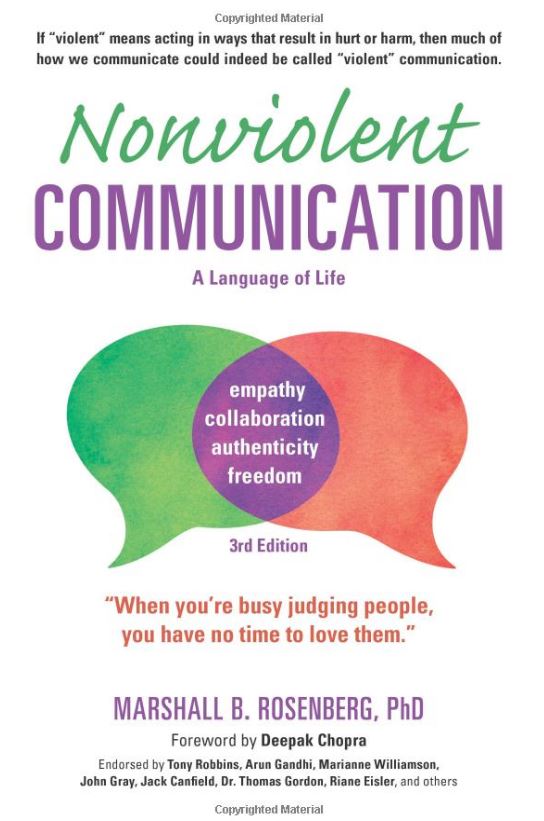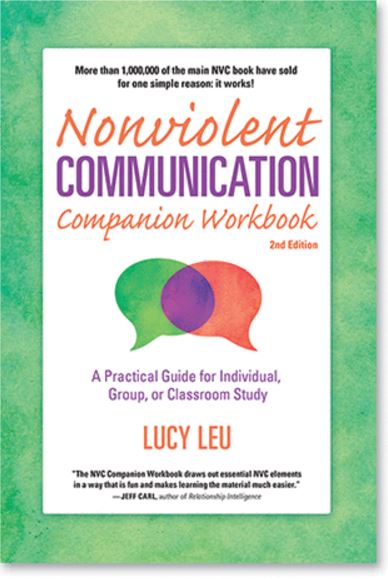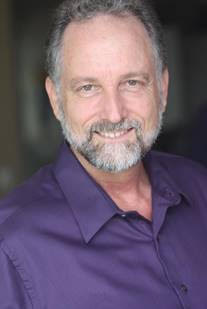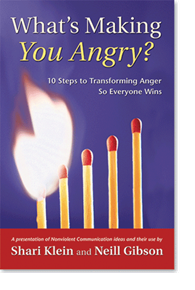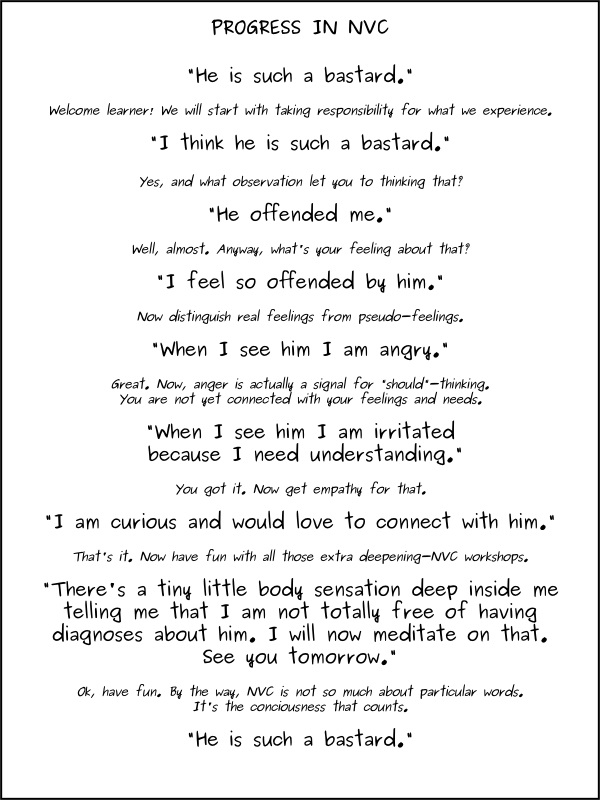Sex, Parenting, Hate and More NVC Quick Connect September 2017
|
What You'll Find in This Month's Newsletter:
Articles - Talking About Sex, by LaShelle Lowe-Charde
- The Best Response to Hate, by Marc Erlbaum
- What Is Social and Emotional Learning, and How Can it Save Students Lives
- NVC Parenting: A Transformative Path, by Stephanie Bachmann Mattei
- Elements of Awesome Feedback, by Alan Seid
Video/Audio - The Purpose of Nonviolent Communication - by Marshall Rosenberg , Shared by Valentina Rosenberg (5.41)
- Marshall Rosenberg- Part Two of a Three Part Series (See Part One) (5.47)
- Dalai Lama Gives UCSD Students Hope, Challenges in Commencement Talk
Quotes by Marshall Rosenberg, Mohandas Ghandi, and Nelson
Mandela
Other Good Stuff - Compassion in Action
- How do You Live Your Dash?
- Almost NVC Cartoon
MISC - Several Wonderful Handouts/Articles
- NVC 3rd Edition Front Cover Revision Update - Feedback Request
Additional NVC Audio Resources - Marshall Rosenberg Songs Remastered
NVC Facebook and Yahoo!
Groups
September Book Specials Three book package specials from PuddleDancer Press
Scroll down to see all... "Whenever you are confronted with an opponent, conquer him with love."
~Ghandi
Featured Article Talking About Sex, by LaShelle Lowe-Charde |
Please visit wiseheartpdx.org, facebook.com/wisehartpdx and youtube.com/lashellenvc.
Possibly one of the most important things to remember when talking with your partner about sex is that fear, guilt, or shame may be present. Fear, guilt, and shame voices might sound something like this: - “Saying no to having sex with my partner is wrong. I should
want to when they want to.”
- “My partner will pull away from me if I don’t have sex when they ask.”
- “When my partner says no to having sex with me, I think I’m not lovable, not attractive, not good enough.”
Lastly, make a plan for exactly how to communicate a “no” in way that you each can hear and stay connected. Here are a couple of examples: - I love and care about you and right now I am noticing that
my need for rest is present. I wonder of we can have a slow start Saturday morning for connecting and making love?
- I feel sad that I don’t have an impulse toward sex at the same time as you right now, because I really do enjoy sex with you. Could I let you know when I am ready?
Let’s look at a possible dialogue:
Pat: I would like to connect around what’s going on for both of us regarding sex in
our relationship. Would you be willing to take an hour or so now to express what’s up for both of us and see what we both want? Chris: I feel nervous because I want acceptance and understanding and not pressure or blame. Would you be willing to stop and restate something if I say I am experiencing pressure or blame? Pat: Yes. I want to reassure you that I am not feeling angry or reactive. What’s most important to me
is that each of us is taking care of ourselves in our relationship. I support you in doing what’s best for you. Can you tell me what you heard? Read More
|
|
|
"The difference between what we do and what we are capable of doing would suffice to solve most of the world's problems" ~Mohandas
Ghandi
Article #2 The Best Response to Hate by Marc Erlbaum, published in The Huffington Post |
This Huffington Post article quotes and refers to Marshall Rosenberg and Nonviolent Communication.
There is a third alternative that
negotiates the fine line between violence and inaction. “Peace,” wrote psychologist and famed global practitioner of conflict resolution Marshall Rosenberg, “requires something far more difficult than revenge or merely turning the other cheek; it requires empathizing with the fears and unmet needs that provide the impetus for people to attack each other.”
Read More ...
|
|
|
"There are times when you have to obey a call which is the highest of all, i.e., the voice of conscience even though such obedience may cost many a bitter tear, and even more, separation from friends, from family, from the state to which you may
belong, from all that you have held as dear as life itself. For this obedience is the law of our being."
~Mohandas Ghandi
Article #3 NVC Parenting:
ATransformative Path By Stephanie Backmann Mattei, Ph.D. |
Stephanie Bachmann Mattei, Ph.D. is the mother of three self-educated children (biological and adopted). Stephanie is a certified trainer with the Center for Nonviolent Communication and a CNVC assessor. For more information please visit TheSanctuary4Parents.org.
I was at around five months of pregnancy when it dawned on me: I was about to raise a human being. This was the most exhilarating and daunting responsibility I had ever embraced. Many years later, I encountered the words of American psychiatrist, Dr. Bruce Perry, "Being born a human being does not ensure a child will become humane. Humans
become humane. The capacity to care, to share, to listen, value and be empathic – to be compassionate – develops from being cared for, shared with, listened to, valued and nurtured. Humane caregiving expresses our capacity to be humane. Inhumane caregiving can decrease or even destroy this capacity." These words capture for me what made my journey into parenting awe-inspiring and breathtaking at the same time.
Read More ...
|
|
|
"Education is the most powerful weapon which you can use to change the world."
~ Nelson
Mandela
Article #4 Elements of Awesome Feedback, by Alan
Seid by Alan Seid |
Alan Seid grew up bilingual, bicultural in Mexico City, Mexico. At 16 Alan decided to be part of the solution rather than problem, and to learn whatever Alan needed to learn to live that. At 18, Alan realized
that my life needed to be about service and contribution, and that that would probably look different than traditional employment. At 21 Alan began following the steps in the Financial Integrity Program detailed in Your Money or Your Life by Vicki Robin & Joe Dominguez, which taught him how to be very clear with money. By 27 he had enough savings to -while living simply- embark on a seven-year self-directed period of intensive research and
learning.
Skillful feedback can support good rapport, high morale, and more effective workplace behaviors. We all want our words and actions to serve and contribute.
Feedback lets us know whether or not we’re hitting the mark. Sometimes we avoid giving feedback because we’re afraid of conflict or of not being liked. Sometimes in giving feedback, our strong emotions about the topic cloud our ability to communicate clearly in the moment. What to do? Read More ...
|
|
|
"Do not judge me by my successes, judge me by how many times I fell down and got back up again."
~ Nelson
Mandela
Video/Audio #1 The Purpose of Nonviolent Communication by Marshall Rosenberg Shared by Valentina
Rosenberg |
|
|
Audio #2 Marshall Rosenberg (Part Two of a Three-Part Series) |
|
|
Video
#3 Dalai Lama gives UCSD students hope, challenges in commencement talk |
|
Read More
|
"Understanding the other persons' needs does not mean you have to give up on your own needs."
~Marshall Rosenberg
Other Good Stuff Compassion in Action Unforgettable! Man's tender serenade for his
grandmother on her 98th birthday will bring tears to your eyes. (There is a 20-second commercial prior to the singing). Read more: |
|
|
|
How Do You Live Your Dash? (One of Marshall's favorite poems)
I read of a man who stood to speak
At the funeral of a friend.
He referred to the dates on her tombstone
From the beginning….. to the end
He noted he first came to her date of
birth
And spoke the following date with tears,
But he said what mattered most of all
Was the dash between those years. (1900 – 1970)
.For that dash represents all the time
That she spent alive on this earth…
And now only those who loved her
Know what that little line is worth.
For it matters not, how much we own:
The cars…the house…the cash,
What matters is how we live and love
And how we spend our dash.
.So think about this long
and hard….
Are there things you’d like to change?
For you never know how much time is left
That can still be rearranged.
If we could just slow down enough
To consider whats true and real,
And always try to understand
The way other people feel.
.And be less quick to anger
And show appreciation more
And love the people in our lives
Like we’ve never loved before.
If we treat each other with respect,
And more often wear a smile….
Remembering
that this special dash
Might only last a little while.
.So when your eulogy’s being read
With your life’s actions to rehash
Would you be proud of the things they say
About how you spent your dash?
. Author Linda Ellis
|
|
|
NVC 3rd Edition Front Cover Revision Update! Feedback Request! We are planning on revising some of the front cover copy on Marshall’s NVC3rd edition book to make it appeal to a broader audience and
to match it up more with the content. Currently it reads- “When you’re busy judging people, you have no time to love them”
We are thinking of changing it - we may
delete first four words if there is not enough room…
In these polarized times, words matter—the way we think, speak, and listen. Find common ground with anyone, anywhere, at any time, both personally and professionally.
What do you think or do
you have another front cover copy idea? We would appreciate hearing from anyone willing to share. |
|
|
"We are never angry because of what others say or do. It is our thinking that makes us angry."
~Marshall Rosenberg
Nonviolent Communication: A Language of Life - 3rd Edition - Create Your Life, Your Relationships, and Your World in Harmony With Your Values |
|
by Marshall B. Rosenberg, Ph.D.
PRODUCT DESCRIPTION 1,000,000 copies sold worldwide • Translated in More Than 30
Languages.
We have priced Marshall’s NVC book at only $5-hoping people will buy additional copies and gift to friends/colleagues
What is Violent Communication? If “violent” means acting in ways that result in hurt or harm, then much of how we communicate—judging others, bullying, having racial bias, blaming, finger pointing, discriminating, speaking without listening, criticizing others or ourselves, name-calling, reacting when angry, using political rhetoric, being defensive or judging who’s “good/bad” or what’s “right/wrong” with people—could indeed be called “violent
communication.”
What is Nonviolent Communication? Nonviolent Communication is the integration of 4 things:
Consciousness: a set of principles that support living a life of empathy, care, courage, and authenticity Language:
understanding how words contribute to connection or distance Communication: knowing how to ask for what we want, how to hear others even in disagreement, and how to move toward solutions that work for all Means of influence: sharing “power with others” rather than using “power over others”.
Nonviolent Communication serves our desire to do three things: 1: Increase our ability to live with choice, meaning, and connection
2: Connect
empathically with self and others to have more satisfying relationships
3: Sharing of resources so everyone is able to benefit
“Nonviolent Communication shows us a way of being very honest, without
any criticism, insults, or put-downs, and without any intellectual diagnosis implying wrongness.” — Marshall B. Rosenberg, PhD
Read More
|
|
|











